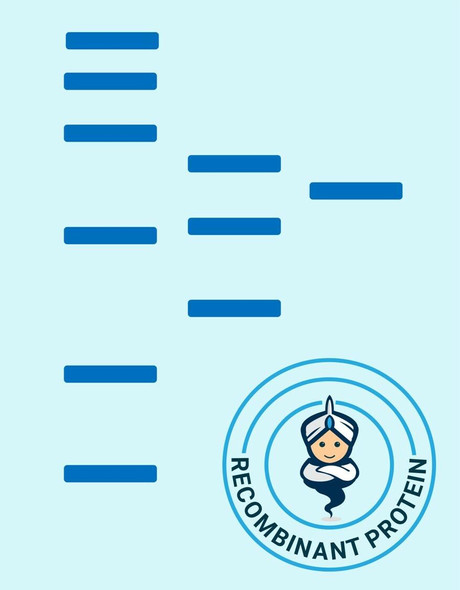Enzymes Recombinant Proteins
Human CHST10 Recombinant Protein (RPPB1495)
- SKU:
- RPPB1495
- Product Type:
- Recombinant Protein
- Species:
- Human
- Uniprot:
- O43529
- Research Area:
- Enzymes
Description
| Product Name: | Human CHST10 Recombinant Protein |
| Product Code: | RPPB1495 |
| Size: | 10µg |
| Species: | Human |
| Target: | CHST10 |
| Synonyms: | Carbohydrate Sulfotransferase 10, HNK1ST, HNK-1 Sulfotransferase,HuHNK-1ST, HNK-1ST, EC 2.8.2.-, EC 2.8.2, CHST10. |
| Source: | Escherichia Coli |
| Physical Appearance: | Sterile Filtered colorless solution. |
| Formulation: | CHST10 protein solution (0.5mg/ml) containing 20mM Tris-HCl (pH8.0) and 10% glycerol. |
| Stability: | Store at 4°C if entire vial will be used within 2-4 weeks. Store, frozen at -20°C for longer periods of time. For long term storage it is recommended to add a carrier protein (0.1% HSA or BSA).Avoid multiple freeze-thaw cycles. |
| Purity: | Greater than 85.0% as determined by SDS-PAGE. |
| Amino Acid Sequence: | MGSSHHHHHH SSGLVPRGSH MTFKDPDVYS AKQEFLFLTT MPEVRKLPEE KHIPEELKPT GKELPDSQLV QPLVYMERLE LIRNVCRDDA LKNLSHTPVS KFVLDRIFVC DKHKILFCQT PKVGNTQWKK VLIVLNGAFS SIEEIPENVV HDHEKNGLPR LSSFSDAEIQ KRLKTYFKFF IVRDPFERLI SAFKDKFVHN PRFEPWYRHE IAPGIIRKYR RNRTETRGIQ FEDFVRYLGD PNHRWLDLQF GDHIIHWVTY VELCAPCEIM YSVIGHHETL EDDAPYILKE AGIDHLVSYP TIPPGITVYN RTKVEHYFLG ISKRDIRRLY ARFEGDFKLF GYQKPDFLLN |
Carbohydrate Sulfotransferase 10, also known as CHST10 is a member ofthe sulfotransferase 2 family. CHST10 was first recognized as asulfotransferase which acts on the human natural killer-1 (HNK-1) glycan.Furthermore, CHST10 is a carbohydrate involved in neurodevelopment as well assynaptic plasticity.�
CHST10 Human Recombinant produced in E.Coli is a single, non-glycosylated polypeptide chain containing 350 amino acids (28-356 a.a) and having a molecular mass of 41.2kDa.CHST10 is fused to a 21 amino acid His-tag at N-terminus & purified by proprietary chromatographic techniques.
| UniProt Protein Function: | HNK1ST: Catalyzes the transfer of sulfate to position 3 of terminal glucuronic acid of both protein- and lipid-linked oligosaccharides. Participates in biosynthesis of HNK-1 carbohydrate structure, a sulfated glucuronyl-lactosaminyl residue carried by many neural recognition molecules, which is involved in cell interactions during ontogenetic development and in synaptic plasticity in the adult. May be indirectly involved in synapse plasticity of the hippocampus, via its role in HNK-1 biosynthesis. Belongs to the sulfotransferase 2 family. |
| UniProt Protein Details: | Protein type:EC 2.8.2.-; Membrane protein, integral; Transferase Chromosomal Location of Human Ortholog: 2q11.2 Cellular Component: Golgi membrane; Golgi apparatus; membrane; integral to membrane Molecular Function:sulfotransferase activity; HNK-1 sulfotransferase activity Biological Process: long-term memory; learning; cell adhesion; carbohydrate biosynthetic process |
| NCBI Summary: | This protein encoded by this gene transfers sulfate to the C-3 hydroxyl of terminal glucuronic acid of protein- and lipid-linked oligosaccharides. This protein was first identified as a sulfotransferase that acts on the human natural killer-1 (HNK-1) glycan; HNK-1 is a carbohydrate involved in neurodevelopment and synaptic plasticity.[provided by RefSeq, Feb 2011] |
| UniProt Code: | O43529 |
| NCBI GenInfo Identifier: | 61211695 |
| NCBI Gene ID: | 9486 |
| NCBI Accession: | O43529.1 |
| UniProt Secondary Accession: | O43529,Q53T18, |
| UniProt Related Accession: | O43529 |
| Molecular Weight: | 356 |
| NCBI Full Name: | Carbohydrate sulfotransferase 10 |
| NCBI Synonym Full Names: | carbohydrate sulfotransferase 10 |
| NCBI Official Symbol: | CHST10�� |
| NCBI Official Synonym Symbols: | HNK1ST; HNK-1ST�� |
| NCBI Protein Information: | carbohydrate sulfotransferase 10; huHNK-1ST; HNK-1 sulfotransferase |
| UniProt Protein Name: | Carbohydrate sulfotransferase 10 |
| UniProt Synonym Protein Names: | HNK-1 sulfotransferase; HNK-1ST; HNK1ST; HuHNK-1ST |
| Protein Family: | Carbohydrate sulfotransferase |
| UniProt Gene Name: | CHST10�� |
| UniProt Entry Name: | CHSTA_HUMAN |






